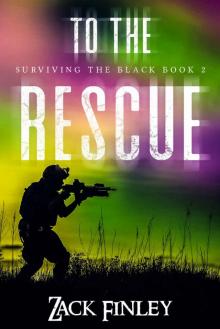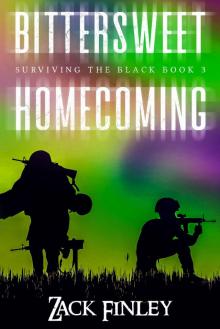- Home
- Zack Finley
Breckinridge Valley: Surviving the Black--Book 1 of a Post-Apocalyptical series Page 6
Breckinridge Valley: Surviving the Black--Book 1 of a Post-Apocalyptical series Read online
Page 6
I was surprised to see Zeke but then learned my gram’s house was his new billet. He said the Oneida crew was dispersed throughout the valley.
I actually knew that, but it slipped my mind. I was glad my mom was the designated coordinator. I also understood why she wanted to get out of the valley last night for a few hours if only to visit Walmart.
By 10 a.m. the crew who went to Clinton returned and were offloading.
My girls were excited and quite chatty about their night out. They were particularly vocal about how rude the boys were. I just hoped Jennifer would still think boys were icky for a few years more, but she was 13, and I suspected I was in for a rude awakening.
They had their weekend farm chores to do. I tagged along. Melissa’s job was collecting eggs and tending goats. Jennifer was responsible for caring for the horses. Jennifer was much happier with horses, last quarter she got up early to milk the cows. I guess that made shoveling out stalls less onerous.
I let Melissa introduce me to the goats. They were very impatient to be fed, but Melissa didn’t give in to their bullying. I took my turn milking them, while Melissa searched out the eggs. Our chickens were split up into several coops. Melissa was responsible for only one. Someone else managed the others. Her five goats lived in their own paddock. Two were nannies, and the other three were their female offspring. Melissa was very matter of fact when telling me the boy goat was sold for meat. She also told me that boy goats were rude and stank.
I left Melissa with the chickens and helped Jennifer haul wheelbarrows of horse manure to the compost pile.
By lunchtime, I needed a shower, and my pancakes were only a fond memory. We walked back home.
A massive pile of Amazon boxes was stacked on the front porch. Fed Ex came through, at least for this part of the order. The girls wanted to know what I bought, so I told them they could open the boxes after we cleaned up and ate lunch.
The postman drove up in his vehicle and unloaded another stack while we were eating lunch.
I thanked him for delivering the boxes, relieved he dropped everything off today.
I printed out my order list and told the girls to check off the items when they spotted them. That started a Christmas-like frenzy, which lasted about 20 minutes. My orders weren’t anything that interested them. I let them off the hook and took over.
While the girls were on to their next chores, I checked my order online and was relieved to see nothing was supposed to be delayed. Three packages were still marked “out for delivery by 8 p.m.”
Most of what I ordered was here. I stacked the empty boxes and packing materials in the garage, figuring they might come in handy. I didn’t want to break down the boxes, because tape would become scarce in the future. I even kept the plastic pillows. Craig came out to help, and about two hours later I stored all my goodies in a fraction of the boxes. Consolidating them in an organized way was hard. I didn’t remove them from their individual packaging, so they took up a lot more space than they would have.
It was nearly dark when the last batch arrived. I thanked the driver and dragged the new boxes into the house. Opening them could now wait.
We were invited to my grandma’s house for dinner. I dragged Craig along, knowing he would skip dinner if I let him. My mom and dad were there, too. My gram served a pork loin, home-made applesauce, butternut squash, potatoes, and a garden salad. We ate apple pie and ice cream for dessert.
I guess it was a celebration of our last regular night on earth. We went home after washing the dishes and cleaning up. The girls were disappointed they couldn’t spend the night. I allowed them to watch television when we got home as a treat. I usually was pretty restrictive but expected that issue to resolve itself.
While they watched TV, I opened my last Amazon packages. I downloaded everything stored in the cloud, including emails. In a flurry of second thoughts, I downloaded a host of books of all varieties from Amazon. Some I’d meant to read for years. Once I finished that I started downloading music.
I kissed the girls goodnight and tucked them in. I knew Jennifer would read for a few hours more, but she was 13. I unplugged us from the electrical grid and went to sleep.
◆◆◆
Chapter 5
I woke up with a call from my dad at 6 a.m. He got an early morning text from Major Thomas, the local National Guard commander, warning us of a special announcement from the president at 8 a.m. Major Thomas told my dad there was a nation-wide alert.
My dad sent out a similar alert to everyone to be at their designated location by 8 a.m.
Several of our inactive members had already arrived in the valley, being billeted with their relatives. My sister, Alice, and her family were due in sometime today. They were told not to stop without a full tank of gas. She lived in Chicago. It was only a 9-hour drive, usually. They called late last night after stopping outside of Louisville, Kentucky. I suspected my mom called her once we got the text telling her to get on the road immediately.
Jules was in California. I hoped he was safe. Several other extended family members sent messages telling us they decided to shelter where they were. I knew Jules’ brother was going to his own bug out location in Arizona. We wished them well.
I felt numb. The knot in the pit of my stomach was threatening to choke me. I hoped this was all a drill. An expensive exercise but still a drill.
Sally texted my dad and me, “Solar website stopped transmitting bogus data, now admits significant CME observed just after midnight.”
That meant it would arrive at the Earth sometime this afternoon or evening.
My mom called to warn me that dad was now on a conference call with Sheriff Lewis and Major Thomas, sharing this information. Sally, who was also our HAM radio operator, was warning people on the prepper circuit.
I turned on the radio and television. So far, no one seemed aware of the presidential address. Dawn on a Sunday morning was not a great time to get in touch with people.
I got on the internet and checked BBC News. American media wasn’t the only one scrambling to find the story.
I did a Google search for CME and caught a few new entries. Not as many as I expected but a few people, likely in European time zones were watching the solar weather site, even at this hour.
By 7 a.m. even local radio stations were buzzing about the emergency presidential address. From Major Thomas, we knew all active duty military personnel were being recalled to duty, but this wasn’t being reported yet on either local or national news.
We heard from most of our allies still in transit. Most would be here by the time of the address. A few were still more than an hour away, and we were worried they might get stuck depending on what the president did. They all filled their tanks and had enough gas to get here.
I suspected that around the world a lot of people were dusting off their reports on EMP or CME and noticing their governments failed to follow any of the recommendations to prepare. We were good at identifying problems, not so good at fixing things that weren’t biting us right now.
Power company executives were likely in hiding. Those charged with keeping the grid up were probably trying to decide how to sacrifice parts of the system to save the whole. The last data I could find suggested there were nearly 3,000 vulnerable transformers in the U.S. and only a few spares. Unfortunately, the way CME attacked the grid, it was unlikely a preemptive shutdown would do a lot of good.
With NASA fudging the solar data, it wasn’t clear what other solar weather was headed our way. At this point, we were flying blind.
European news services broke the information first. This was followed by a cascade of reports from the rest of the media. It was as if no one wanted to be the first to break this news. Getting government officials to go on the record saying the world as we know it could be ending was problematic. In the end, everyone just fell back to the NASA website and confirming professors.
No one seemed aware the American military was now on full alert. The talking heads we
re baffled by what the presidential address was about, although they implied it might be related to the space weather. Few seemed familiar with the real potential, as they talked of solar flares and similar events.
My sister called from Oneida where they were topping off their gas tank. She said the streets were still pretty clear, and no one seemed worried about anything. Most of our flock were within one gas tank of the valley.
Neither Major Thomas nor our sheriff received any orders, yet. The state office of emergency services sent out an alert at around 7 a.m. and urged everyone to tune into the president’s national address. Our allies were calling friends and colleagues to alert them about the presidential address. Our HAM radio colleagues were going nuts.
At 8 a.m. the president told the nation he was declaring a national emergency due to a massive solar flare. He said it might affect parts of the nation’s electrical grid. Scientists weren’t sure how quickly it would arrive, but it might disrupt global communications and satellites. He said the effects could last for weeks in some areas.
The president directed FEMA to work with the National Guard to reduce any disruption. Americans were expected to stay in their homes and stay off the highways. All businesses, not on the strategic list, were to remain closed for the duration. Hospitals, oil refineries, power plants, and other companies on the strategic list should apply for FEMA help to allow their employees to remain on site for the duration. This would reserve all fuel in each area for emergency services. Securing these resources would be one of the many assignments for the National Guard. Any looting or profiteering would be severely punished.
The president ended with the typical platitudes.
I hoped he was right. I hoped the effects would be short term and not widespread. I doubted they issued such a declaration if they actually believed their own platitudes. At least now we knew. This was real. This was serious. We’d know within 10 hours how bad it would be.
I summarized the situation for Jennifer and Melissa when they woke up. Melissa’s only comment was that she was happy to skip school on Monday. Jennifer knew too much to be satisfied. We’d need to chat when Melissa was busy elsewhere.
Major Thomas sent armed National Guard soldiers to close each of the gas stations in two counties. Sheriff Lewis released the inmates at the Kentucky border and then used the inmate bus as a roadblock on TN 297. The Oneida Police would either block its roads or not. Oneida had nearly as many officers as the sheriff did.
On television we watched state troopers across America close the interstates, pushing drivers off the highways. People were directed to close their businesses and go home. Cities became gridlocked, so many remained camped out at their businesses. FEMA authorized the National Guard and local law enforcement to distribute food and other perishables starting on Monday from local stores as long as they kept a precise accounting of any distribution.
Cell phone service crashed as everyone wanted to talk with family and friends. The internet was sluggish, but some texts still got through. Calling outside the local area on the landline, just got the “all lines are busy” messages. The NASA space weather site was down again. I took that as a bad sign that the solar instability was continuing.
It was indeed the calm before the storm. Our Huntsville crew met quietly with their neighbors to discuss what might be ahead. Most got up that morning to discover their world was upside down. Some of our guys were asked to talk with local pastors about what to expect. They rode bicycles to meet with the pastors, as requested.
My dad warned Sheriff Lewis and the Oneida police chief that fresh and frozen foods needed to be distributed right away if the power grid failed, even if it came back up only a few days later. Based on feedback from the discussions our allies were having in town, he suggested recruiting local pastors and the fire department to distribute the food. Sheriff Lewis thought this was a good idea, especially since he didn’t have the manpower to handle it.
Dr. Jerrod spoke to administrators at Mecklin County Hospital. She told them to prepare for the power to be down for two to four weeks, minimum. The doctor told them if they learned most of the U.S. was hit, the power could be down for months, years, or forever. She suggested they cancel all surgeries and appointments for the next week and release any patient they could. Despite the hospital’s large solar power setup, it couldn’t supply enough power for everything this late in the year. She suggested they close sections and consolidate patients to reduce power consumption because they only maintained a few days fuel for their generator.
Dr. Jerrod told me she didn’t expect the administrators to do what she suggested. She said they were an unimaginative group of accountants. I hoped, for the patients’ sake, she was wrong.
Sheriff Lewis told my dad the Tennessee Highway Patrol was too busy closing interstates to help individual counties. Lewis discussed the situation with sheriffs in nearby counties. Everyone was debating putting up roadblocks. They all felt that without barriers, traffic would just avoid the freeways and flood the small highways. No sheriff’s office had the manpower to staff any barricades.
Sheriff Lewis asked my dad to supply some reserve deputies if it looked like we would be overrun from nearby cities. He confessed his guys weren’t keen on leaving their families alone. Once the prisoners left, his entire jail staff went to be with their families. He gave his deputies permission to work out of their homes, hoping to entice them to stay on the job. My dad said Lewis was afraid to push them too hard, fearing they would choose family over the community.
I wondered what the National Guard soldiers deployed at gas stations were thinking. And whether they would abandon their posts when the power finally went out. Soldiers with families would be on pins and needles, especially with no way to communicate with loved ones. I suspected they might willingly deploy to protect their homeland from invaders, but guarding a blacked-out gas station might be a tough sell. Especially with vulnerable family members at home.
It was a tense day. We documented and unloaded much of our spree purchases into storage containers. I wanted to be very careful with these last minute food purchases. The 50-pound sacks of flour, coffee, sugar, and salt needed to be stored properly or they’d ruin. Our long-term food supplies were in better containers. My mom provided locations for everything we acquired. Everything was jumbled together so sorting it out took a lot of hard work. Jennifer, Melissa, and the rest of the valley kids helped out. I’m sure some things got in the wrong places, but on the whole, they did a good job.
Just after dinner, the power grid went down. It was overcast, so we couldn’t see the expected Northern Lights display. We assigned a guard rotation to monitor the valley entrance. Radios and phones were unusable. The receivers just had a lot of static. We sent a pair of armed scouts with night vision goggles riding on silenced electric motorcycles to check on the town and our Huntsville squad. It wasn’t essential, but we were all antsy.
They reported the power went down with a lot of sparking and arcs. There were no fires, at least in Huntsville. Our Huntsville compound was dark, with closed shutters. Our people were fine and would send up a flare if they needed help. Even with full solar, they were exercising light discipline, not wishing to attract attention by having any lights show.
Our scouts made wide berths around the gas stations, not wanting to spook the soldiers sitting in the parked Humvees.
At least tonight people were following directions, staying home and off the roads.
It rained overnight. Showers lingered during the morning. Our first morning without NOAA weather. Heavy static on all radio bands. No cell phone service. No internet. No idea how far the effects of the CME impacted.
My dad took two scouts with him on electric motorcycles to Huntsville to talk with Sheriff Lewis. They were armed with pistols and automatic weapons. They wore body armor under their rain gear.
The population of kids in the valley spiked, with the influx of allies. My mom and grandma assigned tasks for all of them. Jennifer was t
emporarily in charge of goats and chickens. I was glad Melissa didn’t protest working for Jennifer. They didn’t know the new kids well but knew most of them from past valley outings. Most of the new kids had limited experience with food animals.
I joined the work team putting up two portable greenhouses and then took my rotation guarding the valley bridge. We wouldn’t dig out the pillboxes until we knew more about the overall situation.
We were lucky everyone arrived safely. Several late arrivals dodged troopers on the interstate to get here, but they made it through before roadblocks went up on secondary roads. My mom was already working out new billeting plans. I suspected my girls would be doubling up and Craig and I would soon be sharing a room before much longer.
With the Huntsville group still off-site, there was still plenty of room in the valley. No need to do anything more, for now. Food, water, and electricity were still okay in the valley. All of the newer homes in the valley were like mine with the second floor currently used for storage. Once the goods were removed, they could house a lot of people in relative comfort.

 To the Rescue; Surviving the Black--Book 2 of a Post-Apocalyptical Series
To the Rescue; Surviving the Black--Book 2 of a Post-Apocalyptical Series Dire Prophecy
Dire Prophecy Duchy Unleashed
Duchy Unleashed Mad Toffad's Keep
Mad Toffad's Keep Breckinridge Valley: Surviving the Black--Book 1 of a Post-Apocalyptical series
Breckinridge Valley: Surviving the Black--Book 1 of a Post-Apocalyptical series Bittersweet Homecoming; Surviving the Black--Book 3 of a Post-Apocalyptical Series
Bittersweet Homecoming; Surviving the Black--Book 3 of a Post-Apocalyptical Series